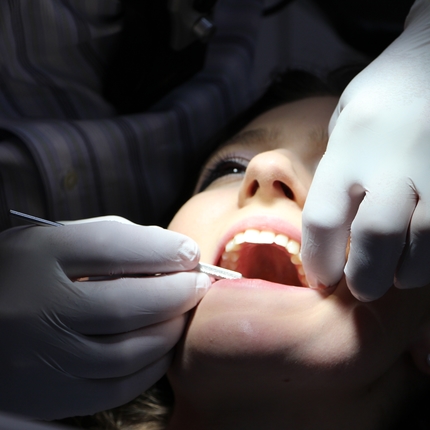Gum disease, also known as periodontitis, can be a significant danger to your oral health. Gum disease is one of the most common dental issues that adults face, and as is the case with all aspects of your dental health, it’s crucial to spot the signs of gum disease early on. Taking preventative measures to ensure proper oral hygiene is always more effective than trying to treat issues after they arise.
Initially, gum disease progresses slowly and without causing pain, but once it develops, symptoms can be numerous and painful. Here are the symptoms of periodontitis that you should look out for:
- Swollen, red, sensitive gums, and other forms of mouth pain or gum discoloration
- Overly sensitive teeth
- Red sores on your gums or the inside of your mouth
- Bleeding gums caused by brushing your teeth, flossing, or biting into solid food
- Receding gums, with significant gaps between your gums and teeth; this may result in your teeth looking longer than usual
- Incessant bad breath, even shortly after brushing
- A metallic taste in your mouth
- Loose (adult) teeth, a difference in your bite, or gaps forming between teeth
- A change in the fit of partial dentures or orthodontics
- Pus excreted between gums and teeth
Periodontitis can be exhibited by any one or more of these symptoms. The good news is that gum disease is extremely preventable, and even if symptoms do arise, there are many effective treatments available. The onset of even one of the above symptoms should be cause for immediate concern and action should be taken right away. If you show any signs of gum disease, we recommend booking a consultation with a dentist.
What is gum disease and how does it arise?
Gum disease ranges from mild forms of gingivitis to serious cases of periodontitis that can cause the destruction of teeth, gums, and connective tissues. When healthy, your gums and bone have a firm grasp on your teeth, holding them in place. Gum disease damages this connection between your gums and teeth.
Gum disease is caused by plaque living on your teeth. Plaque contains bacteria that can be harmful to your teeth. While plaque can be removed with brushing and flossing, if it isn’t cleaned effectively, it eventually hardens into what is called tartar.
Once tartar is allowed to grow below the gum line, harmful toxins in the bacteria begin to cause damage to the gums. In defense of the toxins, gums start to swell. This inflammation of the gums is called gingivitis. Gingivitis is the mildest form of gum disease, but it can be a precursor to more serious forms of periodontitis.
Periodontitis is a more harmful form of gum disease. As bacteria continues to grow in the swollen pockets between the teeth and gums, the body starts to turn against itself. As a result, the connective tissue that holds teeth in place becomes weakened and brown down. This is known as attachment loss.
Over time, your teeth can become loose, weakened, and damaged, potentially requiring removal. Although treatments are available, including professional hygienic treatments and effective home care, the best defense against gum disease is prevention.
Causes of Gum Disease and Risk Factors
It’s crucial to know if you’re at risk for gum disease. That way, you can seek out treatment before any symptoms arise. The following are common risk factors associated with periodontitis.
Preventable Risks:
- Smoking: Smoking is one of the most substantial risks with respect to gum disease, but also one of the most avoidable. Several scientific studies have demonstrated a strong relationship between smoking and periodontitis.
- Stress: Psychological and physical stress can make it difficult for the body to fight infection. Therefore, significant stress can weaken the body against gum disease.
- Poor nutrition, obesity, pregnancy, and diabetes: As is the case with stress, these factors are difficult on the body’s immune system. Any health conditions that impact your body’s ability to fight off infection increase the risk of gum disease.
- Medication: Certain prescription drugs can result in an increased risk of gum disease. If you’re taking anti-depressants, heart medication, or any other prescription drugs, it’s best to notify your dental provider just as you would with a doctor. It helps your dentist to know if you are more susceptible to risk.
- Grinding teeth: Frequent clenching or grinding of teeth causes tension on the connective tissue that binds your teeth and gums together. There are many natural ways to prevent teeth grinding while, including the use of a mouth guard, getting more sleep, drinking more water, and other behavioural techniques.
Unavoidable risks:
- Age: Age is associated with periodontal disease. In the United States, the Centers for Disease Control and Prevention found that 70% of Americans aged 65 and over had some form of gum disease.
- Genetics: As with many diseases, some individuals are more susceptible simply because of their genes. Even the healthiest and most responsible patients can be prone to gum disease, so it’s best to identify increased risk ahead of time.
How to Prevent Gum Disease
Preventing gum disease requires healthy oral habits. We recommend that you brush your teeth after every meal, including your tongue. You should also floss at least once per day, and rinse with a dentist-approved mouthwash after flossing.
Most importantly, talk to a dental professional. We at Vitality Dental, a private dental clinic in West Sussex, can provide you with all the necessary treatment and advice to maintain healthy gums.
Types of Treatment Available for Gum Disease
If you do have gum disease, there are effective treatments available. Treatments include cleanings, medications, and if necessary, surgery. Cleanings are gentle but comprehensive, and typically stop the spreading of infection. These treatments involve scraping off tartar and targeting problematic spots on the root of your teeth.
Medications include antibiotic gels and rinses, as well as oral antibiotics. Gum surgery or bone and tissue grafts may be required if your periodontitis has reached critical levels.
No matter what the type of treatment, it’s important that you maintain regular daily care at home. For more information on gum disease prevention and treatment, contact Vitality Dental today.


